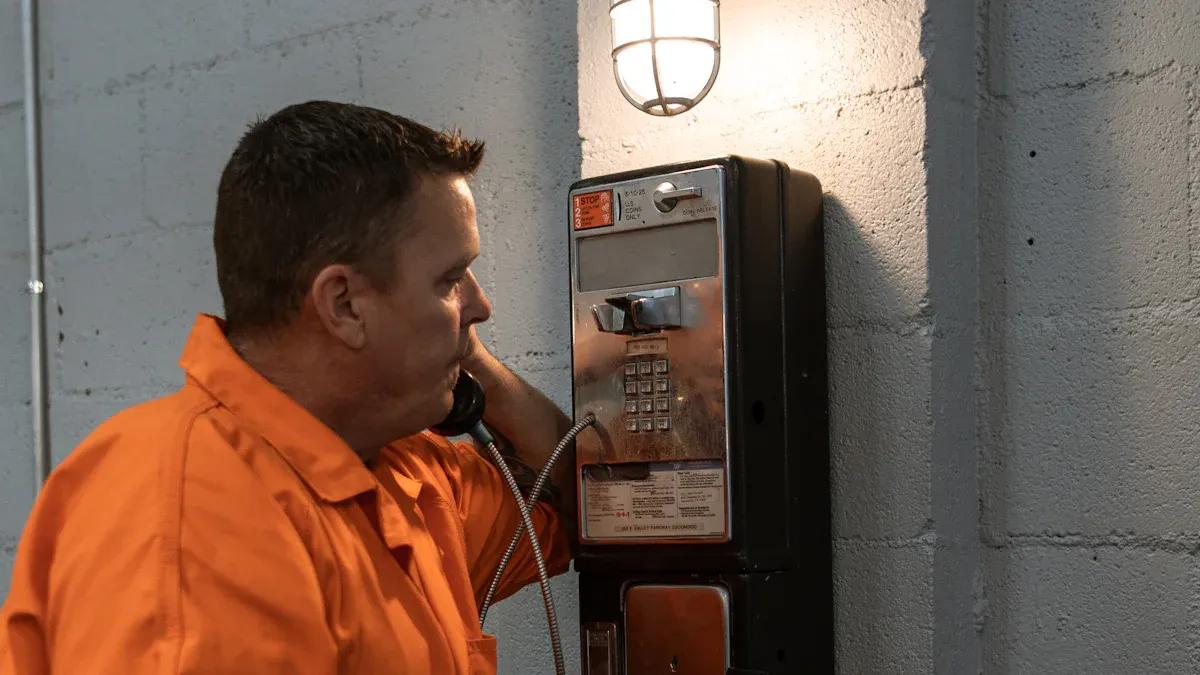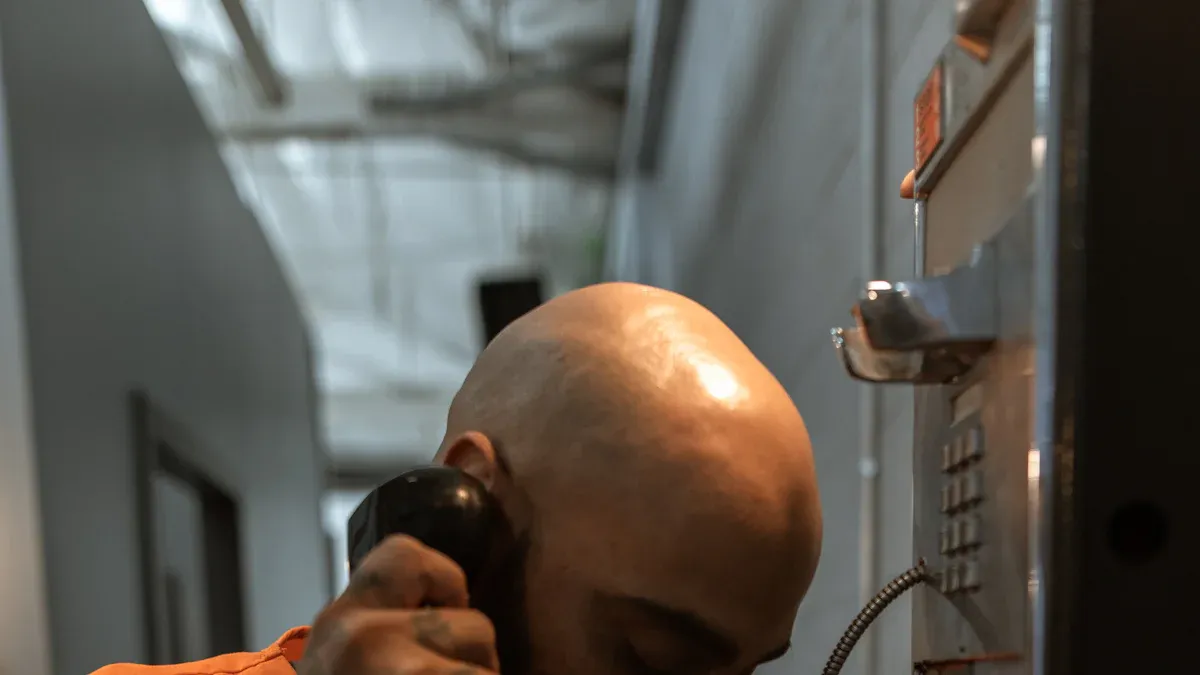
An inmate telephone handset allows individuals in correctional facilities to communicate with the outside world. It serves as a vital tool for maintaining connections with family, friends, and legal representatives. These handsets ensure structured communication while balancing security needs within the facility, fostering emotional and social well-being for inmates.
Key Takeaways
- Inmate phone handsets help inmates talk to family and friends. This reduces loneliness and makes them feel better emotionally.
- These phones keep calls safe by checking them and limiting who inmates can call. This keeps inmates’ needs and the facility’s safety balanced.
- Talking often on these phones helps with legal issues and recovery. It keeps inmates linked to their support systems and helps them handle problems.
What Are Inmate Telephone Handsets?

Definition and Purpose
An inmate telephone handset is a specialized communication device used in correctional facilities. Its primary purpose is to allow inmates to stay connected with the outside world. These handsets are not like regular telephones. They are designed to meet the unique needs of a secure environment. You can think of them as tools that help inmates maintain relationships with family, friends, and legal representatives. This connection can reduce feelings of isolation and improve emotional well-being.
Correctional facilities use these devices to balance communication and security. They ensure that inmates can make calls while preventing misuse. By using an inmate telephone handset, you can see how facilities promote structured communication. This structure benefits both inmates and the facility itself.
How Inmate Telephone Handsets Work
Inmate telephone handsets operate differently from regular phones. Calls made through these devices are monitored and recorded. This ensures that communication stays within legal and safety guidelines. When an inmate wants to make a call, they must first enter a unique identification number. This step links the call to their account. It also helps track call activity.
These handsets often connect to a centralized system. This system manages call permissions, durations, and destinations. For example, you might notice that calls are limited to specific times or numbers. This setup ensures that inmates follow the rules while using the phone. Some systems even use voice recognition to verify the caller’s identity.
Security Features of Inmate Telephone Handsets
Security is a top priority for inmate telephone handsets. These devices include features that prevent unauthorized use. For instance, calls are restricted to approved contacts. This means inmates cannot dial random numbers. Facilities also use call monitoring to detect suspicious activity. If a call violates the rules, it can be flagged or terminated.
Another important feature is call recording. This allows authorities to review conversations if needed. Some systems also block certain types of calls, such as those to unapproved numbers. You might find that these handsets are tamper-resistant. This design prevents inmates from altering or damaging the device.
These security measures ensure that inmate telephone handsets serve their purpose without compromising safety. They allow communication while maintaining control over the process.
The Role of Inmate Telephone Handsets in Correctional Facilities
Supporting Family and Social Connections
You might not realize how important staying connected with family is for someone in a correctional facility. An inmate telephone handset plays a key role in maintaining these bonds. When inmates talk to their loved ones, they feel less isolated. This connection helps them stay emotionally grounded and reminds them of the support waiting for them outside.
Regular communication with family can also reduce stress and anxiety. For example, a quick call to check on a child’s school progress or to share a birthday greeting can make a big difference. These small moments help inmates feel involved in their family’s lives, even from a distance. By using an inmate telephone handset, you can see how these devices strengthen relationships that are crucial for emotional well-being.
Enabling Legal and Professional Communication
Legal matters often require timely communication. Inmates use telephone handsets to contact their lawyers and other legal professionals. This access ensures they can discuss their cases, prepare for court appearances, or seek advice on legal rights. Without this tool, inmates might face delays in resolving their legal issues.
You’ll notice that these handsets also support professional communication. For instance, inmates might use them to connect with counselors or social workers. These conversations can provide guidance on reentry programs or other resources. By facilitating these interactions, inmate telephone handsets ensure that inmates have the support they need to navigate legal and professional challenges.
Promoting Rehabilitation and Mental Health
Rehabilitation is a key goal of any correctional facility. Communication through an inmate telephone handset can contribute to this process. When inmates maintain positive relationships with family and friends, they are more likely to stay motivated to improve their behavior. These connections remind them of the life they want to build after release.
Mental health also benefits from regular communication. Talking to someone who listens and cares can reduce feelings of loneliness and depression. You might find that inmates who use these handsets regularly show better emotional stability. This stability can lead to improved behavior within the facility and a smoother transition back into society.
Inmate telephone handsets are more than just communication tools. They are lifelines that support emotional health, legal rights, and personal growth. By understanding their role, you can see how these devices contribute to a more rehabilitative correctional environment.
Benefits and Challenges of Inmate Telephone Handsets

Advantages for Inmates and Their Families
An inmate telephone handset offers a lifeline for maintaining relationships. You’ll notice how these devices help inmates stay connected with their families, which can reduce emotional stress. Regular calls allow inmates to share updates, celebrate milestones, and remain involved in their loved ones’ lives.
Tip: Staying connected with family can improve emotional well-being and reduce feelings of isolation.
For families, these calls provide reassurance and a sense of closeness. Parents can check on their children, and spouses can offer support during difficult times. This connection strengthens bonds and fosters hope for a better future.
Addressing Security and Misuse Concerns
Security remains a critical aspect of inmate telephone handsets. Facilities use advanced features to prevent misuse. You’ll find that calls are monitored and recorded to ensure compliance with rules. Restricted dialing prevents inmates from contacting unauthorized individuals.
Some systems even use voice recognition to verify identities. These measures protect both inmates and the facility. They ensure that communication serves its intended purpose without compromising safety.
Note: Security features like call monitoring and tamper-resistant designs help maintain order within correctional facilities.
Overcoming Cost and Accessibility Barriers
Cost and accessibility often challenge the use of inmate telephone handsets. Calls can be expensive, making it hard for some families to stay in touch. You might notice that limited access to phones creates frustration among inmates.
Efforts to address these barriers include partnerships with service providers to lower costs. Some facilities explore subsidized programs to make calls more affordable. Increasing the number of handsets and improving scheduling can also enhance accessibility.
| Challenge | Solution |
|---|---|
| High call costs | Subsidized programs |
| Limited accessibility | More handsets and better scheduling |
By tackling these issues, facilities can ensure that inmate telephone handsets remain a valuable tool for communication.
Inmate telephone handsets play a vital role in correctional facilities. They help you stay connected with loved ones, access legal support, and work toward rehabilitation. These devices balance security, accessibility, and emotional well-being. Future advancements could improve affordability and expand access, ensuring that communication remains a cornerstone of inmate support systems.
FAQ
What happens if an inmate misuses the telephone handset?
If an inmate misuses the handset, authorities may restrict their access. Facilities monitor calls to ensure compliance with rules and prevent unauthorized activities.
Note: Misuse can include contacting unapproved numbers or violating call guidelines.
Are inmate telephone handsets available at all times?
No, facilities schedule specific times for phone use. This ensures fair access for all inmates and helps maintain order within the correctional environment.
Why are inmate calls often expensive?
Inmate calls are costly due to service provider fees and security measures. Some facilities work with providers to lower costs or offer subsidized programs for affordability.
Tip: Check if the facility offers discounted call options to reduce expenses.


